Flu, Radio, Stumped, Thon, Frank & Ernest, Momentarily, Curate's Egg, Salver, Tout and Sleeping Tight
Posted 12/15/96
That Goatnosed Feeling
Dear Evan: I recently came across the enclosed advertisement for a book called "How
Not to Catch a Cold" in The New York Times Book Review. As you can see, the author feels
quite strongly that the accepted derivation of the word "influenza" is wrong: "Influenza ... is a
corruption of the Arabic word 'anfalanza.' 'Anf' in Arabic means nose and 'Al-anza' means the
goat. A coughing, drooling, nose-dripping goat is said to have 'anfalanza.' ... The American
Heritage Dictionary specifies the Latin 'influentia' meaning 'influence' as the origin of the word ...
that doesn't make sense.... The goatnosed condition applies more firmly and believably." What
do you think? -- K. Wollard, New York, NY.
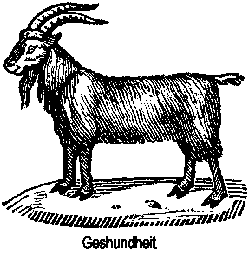 Well, I think I'm not likely to buy this fellow's book anytime soon -- if his theories about
colds are on a par with his theories about the word "influenza," I'd probably be sneezing and
sniffling until the turn of the century. I should note, by the way, that I've got a good head start
already -- as I type this I'm suffering from a doozie of a cold, so you might not want to get too
close to the newspaper.
Well, I think I'm not likely to buy this fellow's book anytime soon -- if his theories about
colds are on a par with his theories about the word "influenza," I'd probably be sneezing and
sniffling until the turn of the century. I should note, by the way, that I've got a good head start
already -- as I type this I'm suffering from a doozie of a cold, so you might not want to get too
close to the newspaper.
Our opinionated goat-fancier might find the "influence" derivation of "influenza" a bit
more "believable" if he spent some time investigating why every major etymological authority
finds it so convincing. "Influencia" in Medieval Latin meant more than "influence" -- based on
"fluere" ("to flow"), "influencia" was thought to be a fluid or emanation given off by certain stars
that governed human affairs. Our modern word "disaster" comes from the same sort of ancient
belief in the calamitous influence of evil ("dis") stars ("astra").
By the time the Latin "influencia" became the Italian word "influenza," an "influenza"
could be almost any kind of epidemic or plague blamed on the stars. Epidemics of a variety of
diseases (scarlet fever, for instance) were referred to as "influenzas." One particularly severe
outbreak of the cold-like disease we now call "the flu" struck Italy in 1743 and spread throughout
Europe. Known originally as "influenza di catarro" ("catarrh epidemic"), the illness came to be
called simply "influenza," as it has been ever since. And now, if you'll excuse me, I have to pop
out to the barn for a moment. I think I just heard a goat sneeze.
No Soap
Dear Mr. Morris: My "Shorter Oxford English Dictionary" devotes almost a page in
definitions and derivatives of the word "radio." However, I cannot locate the origins of the word.
Point me in the right direction if you are so inclined. -- C. W. Wilson, via the Internet.
Inclined? Certainly. In fact, if I were any more inclined, I'd be entirely horizontal. I've
often wondered, to pursue this tilt for a moment, when computer designers are going to get wise
to the fact that what the average user really wants in a computer is not more glitzy software or
"blazingly fast" chips.  What we really want is a computer built into one of those full-tilt living-room recliners, with a little tray for snacks and a remote control. And maybe a mouse you can
click with your toes. That would be real progress.
What we really want is a computer built into one of those full-tilt living-room recliners, with a little tray for snacks and a remote control. And maybe a mouse you can
click with your toes. That would be real progress.
Oh, well, time to sit up straight and answer the question. Following your lead, I looked
up "radio" in the Shorter Oxford, and you're right -- it's no help at all. It says that "radio" comes
from the Latin "radius," but doesn't even explain what "radius" means, which is "stick" or "staff."
If that bit of information doesn't seem like much help, let me hasten to add that "radius" has a
secondary meaning of "spoke of a wheel." Now we're getting somewhere. The metaphor of
wheel-spokes was very useful when it came time in the 14th century to name the phenomenon of
streams of energy emanating from a central source. Thus we dubbed them "rays," giving us the
basis for naming "light rays," "x-rays" and several other kinds of "radiation." Modern physics
doesn't talk too much about "rays" these days, having decided that wrangling over "waves" and
"particles" is more fun, but you'll still find "ray" in the names of certain kinds of radiation.
"Radio," coined in the early 20th century, is actually a shortened form of the original
moniker -- "radiotelegraphy." The first practical use of radio (also known even today in Britain as
"wireless") transmission was to emulate the unmodulated dots and dashes of conventional "wire"
telegraphy. It was only after the technology had progressed to the stage of allowing the sending
of voice, music and, of course, commercials, that the name was shortened to just "radio."
Ninety-nine Thump
Dear Evan: I was wondering if you happen to know the origin of the phrase "I'm
stumped." It's been a question without an answer for many months among my friends. -- Chris &
Steve Dahlquist-Abrams, via the Internet.
Say, just a minute here. Exactly how many of you are asking this question, anyway?
That's a pretty funny "I" you've got going there. So far I count two names, but as far as I know,
you've got a bunch of your friends hidden in the trunk, trying to sneak into this column without
buying their own tickets. Oh, well, the more the merrier, I suppose. Come on in, but mind the
furniture and please don't track those dubious pronouns all over the carpet.
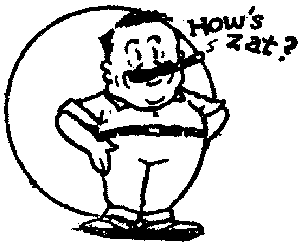 So, stumped by "stumped," are we? It's really a fairly simple story. "Stump" as a verb
meaning "to frustrate, baffle, puzzle or render at a loss" comes from "stump," the noun, which
itself comes from the old German word "stumpf." There are several kinds of "stumps" in the
English language, but all of them stem from the primary sense of the word, which is, as the New
Shorter Oxford English Dictionary puts it, "The part remaining when a limb or other part of the
body is amputated or severed." By metaphorical extension, "stump" has come to mean the part
left behind when nearly anything from a pencil to a sailboat mast has been worn down or broken
off. But the answer to your question lies in "stump" used for "The projecting portion of the trunk
of a felled or fallen tree that remains fixed in the ground." That's right -- the run-of-the-mill,
inconvenient and unmovable tree stump.
So, stumped by "stumped," are we? It's really a fairly simple story. "Stump" as a verb
meaning "to frustrate, baffle, puzzle or render at a loss" comes from "stump," the noun, which
itself comes from the old German word "stumpf." There are several kinds of "stumps" in the
English language, but all of them stem from the primary sense of the word, which is, as the New
Shorter Oxford English Dictionary puts it, "The part remaining when a limb or other part of the
body is amputated or severed." By metaphorical extension, "stump" has come to mean the part
left behind when nearly anything from a pencil to a sailboat mast has been worn down or broken
off. But the answer to your question lies in "stump" used for "The projecting portion of the trunk
of a felled or fallen tree that remains fixed in the ground." That's right -- the run-of-the-mill,
inconvenient and unmovable tree stump.
Now what does the average person do when in the vicinity of a tree stump? One might be
tempted to say, "Climb up on it and make a political speech," which is, in fact, the origin of
phrases such as "stump speech" and "on the stump." But the average person doesn't make a
speech on a stump -- he or she stumbles over it. Middle English even had a verb for it --
"stumpen," meaning "to stumble, as if over a tree stump" -- which became our verb "to stump"
which has so perplexed all of you.
Thonatosis
Dear Evan: In one of your columns recently, you were discussing the origin of the word
"landscape" and made a reference to how "scape" has been appended to words to mean looking
at, etc., as in seascape, or Netscape (ha!).  This reminded me of a discussion I had with a friend of
mine about how "thon" is appended to a lot of words, to mean something long or a race of sorts,
as in "phone-a-thon" or "telethon." My friend asserted that these words derived from the
erroneous assumption that the "thon" in the word "marathon" meant something. He then pointed
out that the same thing has happened with "holic," from alcoholic, and now we have chocoholics,
workaholics, and the like. First I would like to know if my friend is correct about these two
examples, and then I would like to ask if there is a term that explains this phenomena. I see it
happening now with "palooza" -- because of the successful series of rock music festivals called
"Lollapalooza," everything is now "something-a-palooza." Can you help? -- Kris Markman, via
the Internet.
This reminded me of a discussion I had with a friend of
mine about how "thon" is appended to a lot of words, to mean something long or a race of sorts,
as in "phone-a-thon" or "telethon." My friend asserted that these words derived from the
erroneous assumption that the "thon" in the word "marathon" meant something. He then pointed
out that the same thing has happened with "holic," from alcoholic, and now we have chocoholics,
workaholics, and the like. First I would like to know if my friend is correct about these two
examples, and then I would like to ask if there is a term that explains this phenomena. I see it
happening now with "palooza" -- because of the successful series of rock music festivals called
"Lollapalooza," everything is now "something-a-palooza." Can you help? -- Kris Markman, via
the Internet.
Run for your lives -- it's the Invasion of the Cookie-Cutter Suffixes! Your friend is
absolutely right about the "thon" phenomenon. Here we are, up to our necks in walkathons and
bikeathons and dog-frisbee-catch-a-thons, but "thon" by itself really doesn't mean a darn thing.
All these formations have been based on the word "marathon," meaning a 26-mile foot race. But
the original Marathon wasn't a thing -- it was a place in Ancient Greece where the Greeks
defeated the Persians in an important battle in 490 B.C. It was the heroic effort of Pheidippedes,
the Greek messenger who ran the 26 miles between Marathon and Athens carrying the news of
the victory that gave the name "marathon" to a long race or ordeal.
Offhand, I can't think of a general term for this linguistic phenomenon, but it seems to
have started with "telethon," which dates all the way back to the dawn of television itself in the
late 1940's. Personally, I'd put up with a hundred more "thons" if we could just lose "gate," as in
"Troopergate" and "Filegate," to name just two recent examples. There have, of course, been
dozens of such "gates" inflicted on us over the years since the Watergate scandal by the "gate-aholic" media, with no end in sight. Perhaps we should just give up and call the whole
phenomenon "gate-a-thon."
The Importance of Frank and Ernest
It recently occurred to me that it might be interesting to conduct a scientific survey of the
readers of this column -- you know, find out your likes and dislikes, color preferences, bank
balances, that sort of thing. Since all the big polling firms were busy taking surveys to determine
why no one pays any attention to their surveys anymore, I was forced to fall back on tea leaves
and a dusty ouija board for my study, but, in any case, the results were striking. My average
reader has, according to my data, 1.5 cars, 6.3 television sets (for shame!), and 3.25 children.
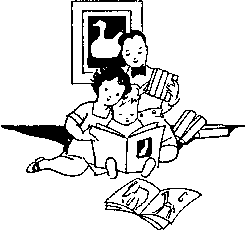 I don't know what kind of mileage you folks get in that 1/2 car, but the revelation that
there were all those kiddies in close proximity to my column set me to thinking. Why not get the
little ones interested in something intellectual at an early age, before all those televisions you're
harboring rot their tiny minds beyond repair? Why not, in fact, get the little munchkins interested
in learning about words and language as soon as they can read?
I don't know what kind of mileage you folks get in that 1/2 car, but the revelation that
there were all those kiddies in close proximity to my column set me to thinking. Why not get the
little ones interested in something intellectual at an early age, before all those televisions you're
harboring rot their tiny minds beyond repair? Why not, in fact, get the little munchkins interested
in learning about words and language as soon as they can read?
No sooner had this thought crossed my mind than a friend drew my attention to two
remarkably nifty books for very young children. Written and illustrated by Alexandra Day,
"Frank and Ernest" and "Frank and Ernest Play Ball" (Scholastic) recount the adventures of two
friends -- Frank (a bear) and Ernest (an elephant) -- as they run other people's businesses while the
owners go on vacation. In the first book, the duo takes over the operation of a diner, while in the
second, they run a baseball team for a week.
Both books are beautifully written and illustrated, but better yet, in a stroke of brilliance,
Ms. Day has made the focus of each story the process of Frank and Ernest learning the specialized
jargon of each of their temporary occupations. They learn to say "mats" for pancakes, "popeye"
for spinach, and "houseboat" for banana split, for instance, in their diner adventure, and baseball
teaches them the lingo of the dugout, including "phenom," "payoff pitch" and "scroogie." These
are wonderful books, and I hope Alexandra Day continues the series.
Quality Time
Dear Evan: I suppose changes to the meanings of words are inevitable, if sometimes irritating.
Am I correct that the word "momentarily" used to just mean "lasting for a moment?" And that
the medium of television has corrupted it through interminable misuse of it as "in a moment" as in
"we'll be returning to Baywatch momentarily"? Of course, with the number of commercials
during a typical broadcast, perhaps they DO mean it in the sense that I always understood it. -- Ed
Stevens, via the Internet.
 My, what an interesting question. And we'll be back to answer it momentarily, right after these
messages.
My, what an interesting question. And we'll be back to answer it momentarily, right after these
messages.
Scared you, didn't I? Ordinarily, I'd be the last one to defend television's frequently, uh, creative
use of the English language, but in this case I'll have to turn the tube loose, because the use of
"momentarily" to mean "in a moment" is neither wrong nor new. "Momentarily" can mean either
"in a moment" or, as you remember it, "for a moment." Both forms are correct, and have been for
a long, long time. It is true that the earliest example of "momentarily," dating to 1654, uses the
word in the "for a moment" sense, but both senses have been used for centuries, although both
were fairly rare until the early 20th century. Instead, people more often used the now-extinct
form "momently," which could mean "in a moment," "for a moment," and, just to confuse things a
bit more, "from moment to moment" or "constantly," as in "We waited at the bus stop, expecting
the bus momently."
When "momentarily" took over from "momently" in popular usage in the early 20th century, the
"for a moment" sense of "momentarily" was the first to appear, but the "in a moment" sense was
hot on its heels. The "constantly" sense of "momently" didn't really make the jump to
"momentarily," for which we should all be grateful.
So both senses of "momentarily" are correct, and, fortunately, it's usually fairly easy to judge
which meaning is meant by the context. Of course, in the case of television, I agree with your
suspicion that they mean "momentarily" in both senses -- they will be back in a moment, but for
just a moment before the next commercial appears.
Wry Back Pages
Every so often, someone will ask me, "So, Evan, what do you do in your spare time?"
This is an easy question to answer since I have no spare time, but if I did, I would say "Why, I
hang out at newsstands." Newsstands are a passion of mine, and I realized recently that the
abundance of newsstands in New York City is, in fact, the only truly plausible reason to live here.
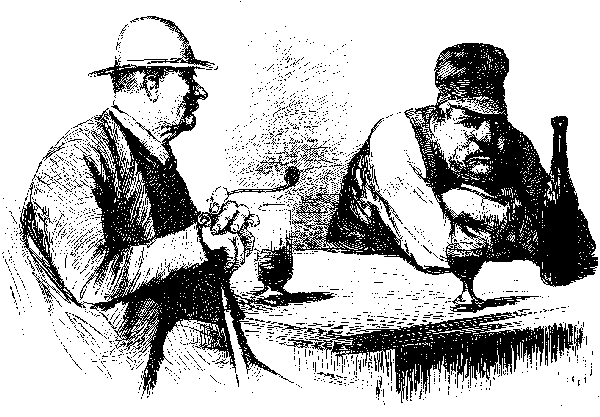 The reason I mention all this is that I noticed on a recent visit to my local newsstand that
the classic British humor magazine Punch, having died a few years back from anemic circulation,
has evidently been resuscitated. The new Punch, I discovered, is a pleasant enough read, but
lacks the quirky edge of the original magazine. The new editors have, however, almost made up
for the magazine's blandness by instituting a feature called the Punch Archive, wherein they
reprint cartoons from the golden age of Punch in the late 19th and early 20th century.
The reason I mention all this is that I noticed on a recent visit to my local newsstand that
the classic British humor magazine Punch, having died a few years back from anemic circulation,
has evidently been resuscitated. The new Punch, I discovered, is a pleasant enough read, but
lacks the quirky edge of the original magazine. The new editors have, however, almost made up
for the magazine's blandness by instituting a feature called the Punch Archive, wherein they
reprint cartoons from the golden age of Punch in the late 19th and early 20th century.
One of the cartoons reprinted in the first issue of the new Punch I picked up was a genuine
classic by George du Maurier, not only a funny cartoon in its own right, but the source of a
remarkably durable and pungent English metaphor. First published in 1895 and titled "True
Humility," it shows a young curate dining with his wealthy Bishop. The host observes that his
guest has been accidentally served a bad egg, to which the curate replies, "Oh no, My Lord. I
assure you! Parts of it are excellent!"
The joke is, of course, that such a thing is impossible -- a rotten egg is 100 percent rotten
and utterly inedible -- but the curate is so afraid of offending his host and possibly damaging his
career that he is willing to eat the egg anyway.
DuMaurier's tag line, "Parts of it are excellent!", caught the popular ear at the turn of the
century, and "a curate's egg" soon became a metaphor for a bad situation that someone persists in
trying to salvage with misplaced or phony optimism. "A curate's egg" is still heard occasionally
today, often incorrectly explained as meaning something that simply has both good and bad
qualities. But that definition blunts the refreshing insight -- that Pollyannas are often ludicrous
opportunists -- of George DuMaurier's classic cartoon.
C'mon, kitty, cats love eggplant
Dear Evan: I recently received a mail-order catalog offering, among other things I don't
need, "vintage salvers" gleaned from the "famous clubs of West End London." The "salvers" are
small silver plates, each bearing the club's insignia. At $150 per plate, I don't plan on buying too
many of these, but I'm curious: where does the term "salver" come from? -- K.W., Columbus,
OH.
When you really stop to think about just what's involved in obtaining those "salvers," the
price doesn't seem so unreasonable. After all, there's the special jacket with extra-deep pockets to
be commissioned, the bribe to the club steward, and, don't forget, the rental for the getaway car.
At least that's how I got mine. They're perfect for feeding the cats, incidentally -- they make the
little fellows feel really special.
 Of course, the whole point of "salvers" is to make someone feel special, whether a
household pet or a doddering London club member being served his brandy on one. Most of us
only encounter the broad flat plates called "salvers" at parties, where they are often used to serve
canap s or appetizers.
Of course, the whole point of "salvers" is to make someone feel special, whether a
household pet or a doddering London club member being served his brandy on one. Most of us
only encounter the broad flat plates called "salvers" at parties, where they are often used to serve
canap s or appetizers.
The word "salver" itself comes from the French "salve," in turn based on the Latin
"salvare," meaning "to save." You sometimes hear that "salvers" are so named because they
"save" one's clothes or carpet from spills, but the actual derivation is slightly more dramatic than
that. "Salvers" were originally the platters used to serve food or drink to a monarch after it had
been sampled by the official court taster and certified as free of poison.
Official tasters have become pass in the last century or so, but perhaps they'll make a
comeback now that scientists have decided that almost everything we eat is bad for us even if it
isn't deliberately poisoned. I just hope my cats don't get the idea that I'm going to start testing
their food for them. It's their job to test mine.
It's the bats that keep me awake
Dear Evan: A fellow member of the Copyediting Digest
steered me to your web site when I queried my cohorts about the origin of "sleep tight." I've looked in several
sources and the best I found was a children's nursery rhyme or song that included the line "Sleep
tight and don't let the bedbugs bite." I'd appreciate any insight you might have on this phrase. --
Julia DeGraf, Evanston, IL.
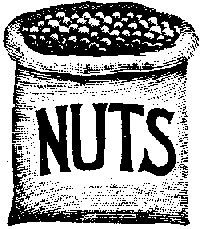 Bed bugs? Not in my house. When I was growing up, my parents used to tuck us away
with "Sleep tight and don't let the IRS bite." Granted, it doesn't fit as well as "bedbugs," but it
made more sense in our house and turned out to be sound advice for later life.
Bed bugs? Not in my house. When I was growing up, my parents used to tuck us away
with "Sleep tight and don't let the IRS bite." Granted, it doesn't fit as well as "bedbugs," but it
made more sense in our house and turned out to be sound advice for later life.
According to etymologist Eric Partridge, the catch phrase "sleep tight and don't let the
bedbugs bite" is the American version of a British "children's goodnight" which differs only in that
it specifies "fleas" as the critters to be avoided. Partridge traced the phrase back to the late 19th
or early 20th century, although he speculates that it may actually be much older, since, he notes,
"This is the type of phrase that ... escapes the attention of lexicographers, even light-hearted
ones."
As to where "sleep tight" itself came from, the Oxford English Dictionary lists "tight" in
this sense as a form of the adverb "tightly," meaning "soundly." Although this "tight" could once
be applied to anything done thoroughly, the OED notes that the only modern usage is in the
phrase "sleep tight."
As a former child myself, I cannot fail to note the double-edged quality of "sleep tight and
don't let the bedbugs bite" as a bedtime farewell. No one I've ever met sleeps soundly after having
been reminded of bedbugs. I submit that the phrase is, in fact, probably the diabolical invention of
a child, and (judging by my personal experience), most likely an older sister.
Highly-touted tooters
Dear Evan: My question has to do with the word "tout." I've heard it pronounced both
"toot" and rhyming with "out" -- which is correct? While we're at it, where did it come from? --
Sandra Goldman, Queens, NY.
 The "rhymes with out" pronunciation is correct. The only reason I can think of for the
"toot" pronunciation would be confusion on the speaker's part between "tout" (as in a
"highly-touted" product) and "tooting one's own horn." Since the most common modern meaning
of "tout" is "to promote or praise energetically," we might say that to "tout" oneself is also to
"toot one's own horn," but there is no relation between the two words. Among other things,
"toot" is what linguists call an "imitative" word, which is just a fancy way of saying that the word
arose as an imitation of a sound, just as did "meow" and "woof."
The "rhymes with out" pronunciation is correct. The only reason I can think of for the
"toot" pronunciation would be confusion on the speaker's part between "tout" (as in a
"highly-touted" product) and "tooting one's own horn." Since the most common modern meaning
of "tout" is "to promote or praise energetically," we might say that to "tout" oneself is also to
"toot one's own horn," but there is no relation between the two words. Among other things,
"toot" is what linguists call an "imitative" word, which is just a fancy way of saying that the word
arose as an imitation of a sound, just as did "meow" and "woof."
"Tout," on the other hand, has a far more roundabout origin. The prehistoric Germanic
root of "tout" meant "something that pokes out," especially "a funnel or spout." From this rather
vague beginning, the word gradually shifted its meaning by the 18th century from "something that
pokes out" to mean "someone who pokes into things" -- in other words, a spy. A "racing tout"
was a spy who surreptitiously observed the training of racehorses in the hope of gleaning valuable
information which could then be sold to bookmakers. In many cases, the "tout" and the
bookmaker were one and the same, and racetracks were usually rife with platoons of "touts," each
claiming to have inside information on the condition of the horses. Over time, the verb "to tout"
came to mean "loudly promoting one's business or product," especially in an annoying
fashion.
Today's verb "to tout," almost always found in the phrase "highly touted," is an inherently
skeptical word -- the implication is that the product cannot possibly measure up to its
advertisements.
Take me back to the main Word Detective page.
Take me to the Index of back columns.

Member of the Internet Link Exchange
All contents Copyright © 1996 by Evan Morris.
 Well, I think I'm not likely to buy this fellow's book anytime soon -- if his theories about
colds are on a par with his theories about the word "influenza," I'd probably be sneezing and
sniffling until the turn of the century. I should note, by the way, that I've got a good head start
already -- as I type this I'm suffering from a doozie of a cold, so you might not want to get too
close to the newspaper.
Well, I think I'm not likely to buy this fellow's book anytime soon -- if his theories about
colds are on a par with his theories about the word "influenza," I'd probably be sneezing and
sniffling until the turn of the century. I should note, by the way, that I've got a good head start
already -- as I type this I'm suffering from a doozie of a cold, so you might not want to get too
close to the newspaper. What we really want is a computer built into one of those full-tilt living-room recliners, with a little tray for snacks and a remote control. And maybe a mouse you can
click with your toes. That would be real progress.
What we really want is a computer built into one of those full-tilt living-room recliners, with a little tray for snacks and a remote control. And maybe a mouse you can
click with your toes. That would be real progress. So, stumped by "stumped," are we? It's really a fairly simple story. "Stump" as a verb
meaning "to frustrate, baffle, puzzle or render at a loss" comes from "stump," the noun, which
itself comes from the old German word "stumpf." There are several kinds of "stumps" in the
English language, but all of them stem from the primary sense of the word, which is, as the New
Shorter Oxford English Dictionary puts it, "The part remaining when a limb or other part of the
body is amputated or severed." By metaphorical extension, "stump" has come to mean the part
left behind when nearly anything from a pencil to a sailboat mast has been worn down or broken
off. But the answer to your question lies in "stump" used for "The projecting portion of the trunk
of a felled or fallen tree that remains fixed in the ground." That's right -- the run-of-the-mill,
inconvenient and unmovable tree stump.
So, stumped by "stumped," are we? It's really a fairly simple story. "Stump" as a verb
meaning "to frustrate, baffle, puzzle or render at a loss" comes from "stump," the noun, which
itself comes from the old German word "stumpf." There are several kinds of "stumps" in the
English language, but all of them stem from the primary sense of the word, which is, as the New
Shorter Oxford English Dictionary puts it, "The part remaining when a limb or other part of the
body is amputated or severed." By metaphorical extension, "stump" has come to mean the part
left behind when nearly anything from a pencil to a sailboat mast has been worn down or broken
off. But the answer to your question lies in "stump" used for "The projecting portion of the trunk
of a felled or fallen tree that remains fixed in the ground." That's right -- the run-of-the-mill,
inconvenient and unmovable tree stump. This reminded me of a discussion I had with a friend of
mine about how "thon" is appended to a lot of words, to mean something long or a race of sorts,
as in "phone-a-thon" or "telethon." My friend asserted that these words derived from the
erroneous assumption that the "thon" in the word "marathon" meant something. He then pointed
out that the same thing has happened with "holic," from alcoholic, and now we have chocoholics,
workaholics, and the like. First I would like to know if my friend is correct about these two
examples, and then I would like to ask if there is a term that explains this phenomena. I see it
happening now with "palooza" -- because of the successful series of rock music festivals called
"Lollapalooza," everything is now "something-a-palooza." Can you help? -- Kris Markman, via
the Internet.
This reminded me of a discussion I had with a friend of
mine about how "thon" is appended to a lot of words, to mean something long or a race of sorts,
as in "phone-a-thon" or "telethon." My friend asserted that these words derived from the
erroneous assumption that the "thon" in the word "marathon" meant something. He then pointed
out that the same thing has happened with "holic," from alcoholic, and now we have chocoholics,
workaholics, and the like. First I would like to know if my friend is correct about these two
examples, and then I would like to ask if there is a term that explains this phenomena. I see it
happening now with "palooza" -- because of the successful series of rock music festivals called
"Lollapalooza," everything is now "something-a-palooza." Can you help? -- Kris Markman, via
the Internet. I don't know what kind of mileage you folks get in that 1/2 car, but the revelation that
there were all those kiddies in close proximity to my column set me to thinking. Why not get the
little ones interested in something intellectual at an early age, before all those televisions you're
harboring rot their tiny minds beyond repair? Why not, in fact, get the little munchkins interested
in learning about words and language as soon as they can read?
I don't know what kind of mileage you folks get in that 1/2 car, but the revelation that
there were all those kiddies in close proximity to my column set me to thinking. Why not get the
little ones interested in something intellectual at an early age, before all those televisions you're
harboring rot their tiny minds beyond repair? Why not, in fact, get the little munchkins interested
in learning about words and language as soon as they can read?  My, what an interesting question. And we'll be back to answer it momentarily, right after these
messages.
My, what an interesting question. And we'll be back to answer it momentarily, right after these
messages.  The reason I mention all this is that I noticed on a recent visit to my local newsstand that
the classic British humor magazine Punch, having died a few years back from anemic circulation,
has evidently been resuscitated. The new Punch, I discovered, is a pleasant enough read, but
lacks the quirky edge of the original magazine. The new editors have, however, almost made up
for the magazine's blandness by instituting a feature called the Punch Archive, wherein they
reprint cartoons from the golden age of Punch in the late 19th and early 20th century.
The reason I mention all this is that I noticed on a recent visit to my local newsstand that
the classic British humor magazine Punch, having died a few years back from anemic circulation,
has evidently been resuscitated. The new Punch, I discovered, is a pleasant enough read, but
lacks the quirky edge of the original magazine. The new editors have, however, almost made up
for the magazine's blandness by instituting a feature called the Punch Archive, wherein they
reprint cartoons from the golden age of Punch in the late 19th and early 20th century.  Of course, the whole point of "salvers" is to make someone feel special, whether a
household pet or a doddering London club member being served his brandy on one. Most of us
only encounter the broad flat plates called "salvers" at parties, where they are often used to serve
canap s or appetizers.
Of course, the whole point of "salvers" is to make someone feel special, whether a
household pet or a doddering London club member being served his brandy on one. Most of us
only encounter the broad flat plates called "salvers" at parties, where they are often used to serve
canap s or appetizers. Bed bugs? Not in my house. When I was growing up, my parents used to tuck us away
with "Sleep tight and don't let the IRS bite." Granted, it doesn't fit as well as "bedbugs," but it
made more sense in our house and turned out to be sound advice for later life.
Bed bugs? Not in my house. When I was growing up, my parents used to tuck us away
with "Sleep tight and don't let the IRS bite." Granted, it doesn't fit as well as "bedbugs," but it
made more sense in our house and turned out to be sound advice for later life.  The "rhymes with out" pronunciation is correct. The only reason I can think of for the
"toot" pronunciation would be confusion on the speaker's part between "tout" (as in a
"highly-touted" product) and "tooting one's own horn." Since the most common modern meaning
of "tout" is "to promote or praise energetically," we might say that to "tout" oneself is also to
"toot one's own horn," but there is no relation between the two words. Among other things,
"toot" is what linguists call an "imitative" word, which is just a fancy way of saying that the word
arose as an imitation of a sound, just as did "meow" and "woof."
The "rhymes with out" pronunciation is correct. The only reason I can think of for the
"toot" pronunciation would be confusion on the speaker's part between "tout" (as in a
"highly-touted" product) and "tooting one's own horn." Since the most common modern meaning
of "tout" is "to promote or praise energetically," we might say that to "tout" oneself is also to
"toot one's own horn," but there is no relation between the two words. Among other things,
"toot" is what linguists call an "imitative" word, which is just a fancy way of saying that the word
arose as an imitation of a sound, just as did "meow" and "woof."